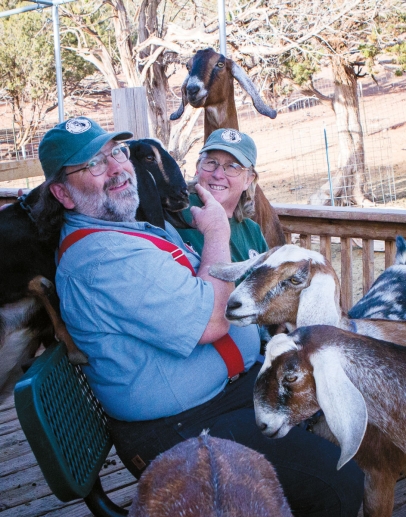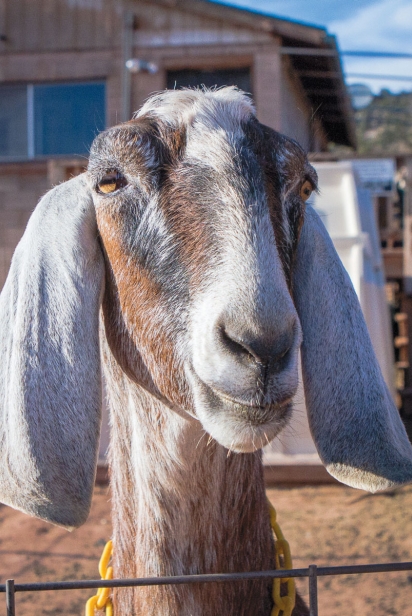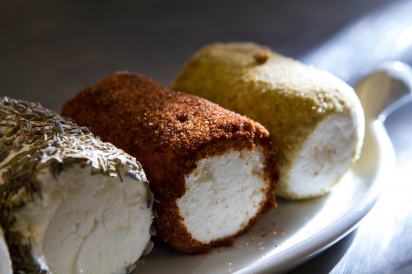Black Mesa Ranch Growing Sustainably
Editor’s Note: This article is the second in a four-part series to revisit the locals we profiled in our first year of publication as a lead-up to our 10th anniversary celebration in Spring 2016. In the last issue we revisited Kevin Binkley with Gwen Ashley Walters.
Farming is challenging in the best of circumstances. Farming and making goat cheese in the middle of the desert—on an off-the-grid parcel of land hours away from a major consumer market—is a genuine leap of faith.
Doing so as a retirement plan—at a time when “fine cheese” meant imported cheese and local cheese was not yet a “thing” beyond a few coastal and Midwestern hot spots—that was downright pioneering.
In 2000, David and Kathryn Heininger moved to the high desert, nine miles east of Snowflake, AZ, a remote and sparsely populated quadrant of the state with just such a dream. The couple founded Black Mesa Ranch, a 280-acre working ranch in Arizona’s scenic White Mountain region. They have been growing sustainably ever since.
Visiting the Ranch
A far cry from the saguaros and scorching summer temperatures of southern Arizona, this high-elevation, four-season climate enjoys more mild summers and regular snow in winter. The terrain is rugged, dusty and definitively Southwestern.
The last six miles to the ranch traverse a series of dusty dirt roads that snake up and down through open range. Herds of the neighboring ranchers’ meat cattle roam free, skittish calves scrambling over rocky outcrops to keep up with their mothers. Scrub brush, native grasses and cloudless blue sky stretch endlessly in every direction.
The ranch is visible well before arrival, sitting at a slightly lower elevation below the main road. The farm’s large solar array glistens in the distance. Just past the gate, a flock of sheep—ewes and lambs—scuttle away at the sound of the car. Their escorts, three sweet-faced but imposing Anatolian Shepherds, the livestock guardian dogs, sound the alarm.
We round the corner toward a small group of buildings, including the barn and milking parlor, adjacent to two animal pens: one containing a large group of pigs and, on the other side, a raucous cacophony of baby goat cuteness.
While perhaps best known for their goat cheese and seasonal line of goat milk candies popular in markets, resorts and fine restaurants throughout the Arizona, the Heiningers also produce farm-raised pork and lamb.
The diversification of farm animals produces a more harmonious, sustainable result. Whey, a byproduct of cheesemaking, goes on to “whey stations” to nourish a small group of Hampshire Duroc pigs. The resulting tasty pork is served at fine restaurants like Binkley’s in Cave Creek.
“We moved out here to get away from the city,” says David. The plan was to create a small, sustainable family farm as a second-act career. Previously, he worked as a chef in Texas and the Northeast. This culinary background shines through in the various products the farm produces, each an integral part adding up to sustainability.
A Few Goats
Originally the plan was to raise animals for meat. Once they got a few goats, ostensibly to provide fluid milk and farm cheese for personal consumption.
The thing with goats is that few people seem to be able to stop at just a few. Soon, the endearing and productive Nubians earned an expanded place on the ranch.
“We had to build a dairy to support our goat habit,” says Kathryn. “It’s a working farm and the goats need to support themselves.”
Today, the farm is home to around 30 milking Nubian does, with their distinctive floppy ears, high wide-set eyes and prominent “Roman” nose. The genetics for Nubian, or Anglo-Nubian, goats was developed in England, where native English milk goats were bred with bucks imported from India, Russia and Egypt.
With their high tolerance for temperature extremes, Nubians are particularly well suited to the Arizona climate. The breed produces extremely rich milk, though in slightly lower quantities than other dairy goat breeds. It is particularly prized for cheesemaking.
BMR goats have won many prestigious awards for production and superior genetics. Their bucks are highly prized in the goat world with farmers from as far away as Alaska trekking to Arizona to improve their herd genetics.
The goats have been Certified Humanely Raised and Handled since 2006. This rigorous certification requires dairies to meet or exceed precise and objective standards for the treatment of farm animals.
At milking time, each morning and afternoon, does come into the small milking parlor. Surprisingly, each goat has her place in the herd hierarchy, knowing when to take her turn and even which milking stand is hers.
“They are on par with dogs for intelligence, but have a cat’s personality,” says David. When you see the love and affection between the farmers and their does, it’s clear neither the goats nor the Heiningers would like to be anywhere else.
Growing Over Time
Dairy is Arizona’s largest agricultural commodity, with just 110 dairies averaging more than 1,500 cows each. Some of the largest operations have herds of 8,000 or more. Production per animal is among the highest in the nation, averaging 23,626 pounds of milk per cow.
When Black Mesa Ranch was originally licensed in 2003, it was the only goat dairy in the state, and a micro-dairy at that.
“We were something of an oddity,” recalls David. “It took some patient discussions with the state Agriculture department to keep them on track with this new direction, but they ended up being integral partners in our dairy’s development.”
Twelve years later, there are at least six goat dairies in the state, all thriving in their own niches. The Heiningers also credit the growth of the Eat Local movement catching on in Arizona.
Since they have been farming, “Farm to fork has gone from being a fringe fad to a paradigm shift in the way many of us look at who, and what, we eat,” David says. “When we began in 2003, there were few farmers’ markets, no Edible Phoenix, no Farmer+Chef conferences. Local sourcing was not the norm. Now Arizona-sourced ingredients are listed with pride on the finest menus.”
Daily Life Today
The Ranch is a two-person operation. No interns or milkers, just David and Kathryn. The daily schedule required to run a successful, sustainable small farm of this sort is hard to fathom.
In season, David makes cheese twice a day, directly after milking. This intensive production schedule is necessary because a bulk tank to cool and store the milk for cheesemaking several times a week is just not practical at this “off the grid” ranch.
David produces a variety of fresh and flavored goat cheeses and a seasonal line of goat milk caramels and chocolates, available late fall through Valentine’s Day, a nod to his former life as a pastry chef.
Making cheese twice a day, cleaning between batches, the dairy and farm chores, shipping and order fulfillment, maintaining the utilities, including two wells and the roads, it’s hard to see when they have time to rest.
“People call it the simple life,” David grins and shakes his head. “Doesn’t mean it’s not great, but it’s not easy.”
Recent Developments
A trio of aged goat cheeses has been introduced by Black Mesa Ranch. These cheeses are more time- and resource-intensive, requiring additional climate-controlled aging space. With the recent award of a “Fork to Farm” grant from Bon Appétit Management Company, an aging room and an additional solar array have been installed.
With additional aging space, David expects to increase production of Dutchess, a six-month-aged Gouda-style cheese with tasty caramel-sweet notes, and the savory, nutty Alpinestyle cheese, enchantingly named Emmenthraller. Black Mesa Ranch Blue Goat rounds out the trio and sets a high bar as more and more aged cheeses are developed in the state.
Looking to the future, the couple expects to be doing exactly what they’ve been doing these past 12 years. They will likely introduce some new cheeses or candies but have no plans to grow in size or scope.
“Realistically, we are as big as we can be to maintain sustainability—both for our land and for our personal lives,” says Kathryn. “We love what we are doing and we like being small, nimble and a niche farmstead operation.”
Thanks to the marvel of logistics—a UPS driver picks up their wares direct from the farm several times a week, whisking their products anywhere in the state, overnight, for a reasonable cost—the couple is able to focus on the on-farm operations rather than on order fulfillment. Over the years, their products have found homes at many of the area’s top specialty stores, resorts and restaurants while continuing to honor the original dream of a simple life away from the big city grind.






